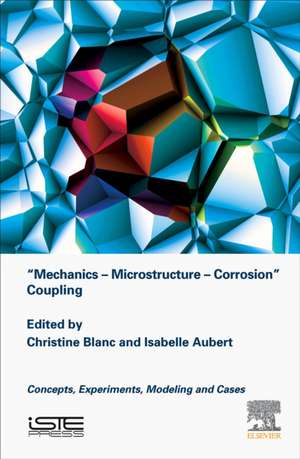Mechanics - Microstructure - Corrosion Coupling: Concepts, Experiments, Modeling and Cases
Editat de Christine Blanc, Isabelle Auberten Limba Engleză Hardback – 19 feb 2019
In addition, the book presents the latest advances in research in these areas (hydrogen embrittlement, stress corrosion, fatigue, etc.), especially in the consideration of the multi-scale aspect of the phenomena in the implementation of dedicated experiments.
- Reviews the status of scientific and technological developments related to the durability of materials
- Addresses experimental, theoretical and numerical aspects at different scales
- Provides the most advanced tools and scientific approaches
- Focuses on the latest advances, such as hydrogen embrittlement, stress corrosion, fatigue, and more
Preț: 1250.00 lei
Preț vechi: 1752.49 lei
-29% Nou
Puncte Express: 1875
Preț estimativ în valută:
239.18€ • 249.75$ • 197.51£
239.18€ • 249.75$ • 197.51£
Carte tipărită la comandă
Livrare economică 08-22 aprilie
Preluare comenzi: 021 569.72.76
Specificații
ISBN-13: 9781785483097
ISBN-10: 1785483099
Pagini: 572
Dimensiuni: 152 x 229 mm
Greutate: 0.93 kg
Editura: ELSEVIER SCIENCE
ISBN-10: 1785483099
Pagini: 572
Dimensiuni: 152 x 229 mm
Greutate: 0.93 kg
Editura: ELSEVIER SCIENCE
Cuprins
Part 1. The Basics for Understanding Mechanics–Environment–Microstructure Couplings
1. Environmentally Assisted Cracking
2. The Basics to Better Understand Couplings in Physical Metallurgy
3. Continuum Mechanics
4. Fatigue Crack Initiation and Propagation
5. Surface Chemistry and Passivation of Metals and Alloys
6. Electrochemistry for Mechanically assisted Corrosion
7. Modeling Tools: From the Atom to the Macroscopic Scale
Part 2. Hydrogen and the Embrittlement of Metallic Materials Ad/Absorption, Trapping and Transport Mechanisms
8. State of Hydrogen in Matter: Fundamental Ad/Absorption, Trapping and Transport Mechanisms
9. Hydrogen and Crystal Defects Interactions: Effects on Plasticity and Fracture
10. Industrial Consequences of Hydrogen Embrittlement
11. Experimental Techniques for Dosage and Detection of Hydrogen
Part 3. Stress Corrosion Cracking
12. Effect of Stress/Strain Fields on Electrochemical Activity: Metallurgy/Stress Interaction and Surface Reactivity
13. Stress Corrosion Cracking. Between the Corrosion Defect and the Long Crack: The Phase of the Initiation of the Cracks
14. Stress Corrosion Crack Propagation
15. Oxidation-assisted Cracking
16. Stress Corrosion Cracking: From In-service Cracking to Laboratory Studies
Part 4. Corrosion Fatigue
17. Corrosion and Hydrogen Fatigue at Different Scales
18. Local-scale Modeling of Plasticity–Environment Interactions
19. Specific Cases of Corrosion Fatigue
Part 5. Additional Information and the Paths to Solving Interrelated Problems
20. Local Electrochemical Methods Adapted to Studying Environment–Microstructure–Mechanics Couplings
21. Mechanical Tests in Corrosive Environments and Under Gaseous Hydrogen
22. Liquid Metal Embrittlement
1. Environmentally Assisted Cracking
2. The Basics to Better Understand Couplings in Physical Metallurgy
3. Continuum Mechanics
4. Fatigue Crack Initiation and Propagation
5. Surface Chemistry and Passivation of Metals and Alloys
6. Electrochemistry for Mechanically assisted Corrosion
7. Modeling Tools: From the Atom to the Macroscopic Scale
Part 2. Hydrogen and the Embrittlement of Metallic Materials Ad/Absorption, Trapping and Transport Mechanisms
8. State of Hydrogen in Matter: Fundamental Ad/Absorption, Trapping and Transport Mechanisms
9. Hydrogen and Crystal Defects Interactions: Effects on Plasticity and Fracture
10. Industrial Consequences of Hydrogen Embrittlement
11. Experimental Techniques for Dosage and Detection of Hydrogen
Part 3. Stress Corrosion Cracking
12. Effect of Stress/Strain Fields on Electrochemical Activity: Metallurgy/Stress Interaction and Surface Reactivity
13. Stress Corrosion Cracking. Between the Corrosion Defect and the Long Crack: The Phase of the Initiation of the Cracks
14. Stress Corrosion Crack Propagation
15. Oxidation-assisted Cracking
16. Stress Corrosion Cracking: From In-service Cracking to Laboratory Studies
Part 4. Corrosion Fatigue
17. Corrosion and Hydrogen Fatigue at Different Scales
18. Local-scale Modeling of Plasticity–Environment Interactions
19. Specific Cases of Corrosion Fatigue
Part 5. Additional Information and the Paths to Solving Interrelated Problems
20. Local Electrochemical Methods Adapted to Studying Environment–Microstructure–Mechanics Couplings
21. Mechanical Tests in Corrosive Environments and Under Gaseous Hydrogen
22. Liquid Metal Embrittlement
